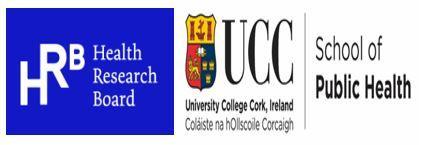In This Section
- Home
- About ESPRIT
- Our Research
- Health Research Board Research Leader Award
- Health Research Board (HRB) Applied Partnership Award
- The Choosing Healthy Eating for Infant Health(CHErIsH) Study
- Reducing Maternal Stress in Ireland
- GPSEP-way
- EPICC
- CDA - Chronic Disease Prevention
- CDA - Diabetic Foot Disease
- REACT
- SCaRLeT
- Self-management Support in Cancer Care
- PPI (Public and Patient Involvement)
- People
- Training & Events
- Dissemination
- Athena SWAN
Evidence for Policies to Prevent Chronic Conditions
About EPICC
The EPICC is an ongoing HRB funded secondary data analysis project which uses range of existing Irish datasets (TILDA, Healthy Ireland, Mitchelstown Cohort Study, HIPE, Retina Screen) to obtain robust estimates of prevalence of individual chronic conditions and their combination at national level, together with accompanying risk factors. EPICC combines clinical knowledge together with necessary skills and expertise of academics from various disciplines, including Epidemiologists, Biostatisticians, Pharmacists, Health Economists and Health Service Researchers.
Which chronic conditions are studied?
Nine chronic conditions are prioritised by the Integrated Care Programme for the Prevention and Management of Chronic Disease. These include:
| Diabetes | Stroke |
| Asthma | Transient Ischemic Attack |
| Chronic Obstructive Pulmonary Disease | Atrial Fibrillation |
| Coronary Heart Disease | Hypertension |
| Heart Failure |
Chronic disease is the leading cause of death and disability worldwide and the major health challenge to global development. It also contributes to constant increase in discrepancy between available resources and healthcare expenses in many European countries, including Ireland.
Why are we doing this research and why is this important?
People suffering from chronic disease often experience impaired quality of life and lower life expectance, and some socioeconomic factors, such as poverty and low education, may as well contribute to these conditions. However, most chronic diseases are nowadays caused by a small number of increasing risk factors which can be easily prevented or modified. These include lifestyle habits such as tobacco and alcohol use, physical inactivity and unhealthy diet.
What are main objectives of EPICC?
The aim of our research project is to study these factors and to obtain better understanding of their impact on chronic diseases. Our focus will be on further improvement in their early detection and treatment which is critical to prevention of chronic disease development among those at risk.
In addition to this, the Irish government has launched Sláintecare, a 10-year programme which should make health and social services accessible to everybody based on their need, and promote health in the general population through disease prevention.
The EPICC is organised into four working packages:
- WP1. Prevalence of Chronic Disease and Comorbidities
- WP2. Social Inequalities in Chronic Disease
- WP3. Modelling of Policy Interventions for Chronic Disease Prevention
- WP4. Knowledge Translation through continuous engagement and information exchange between Academics, Clinicians and Patients as final Knowledge Users
Chronic Disease Burden in Ireland Report May 2022
Chronic diseases like heart disease and diabetes are the most common causes of death throughout Europe, including Ireland. The rise in chronic disease is increasing demand on health systems worldwide and is extremely costly for governments. In addition to this increasing demand, there is a widening gap between available resources and healthcare costs. The costs will continue to increase unless governments can find a better way to prevent and treat these diseases.

Chronic Disease Burden in Ireland Report - May 2022
EPICC - Prevalence of Chronic Conditions in Ireland 2022. Policy brief
EPICC Research Team Prof. Patricia Kearney, Dr Claire Buckley, Dr Tony Fitzgerald, Dr Katarzyna Gajewska, Dr Sheena McHugh, Dr Brendan Palmer, Dr Linda O’Keeffe and Dr Danko Stamenic (School of Public Health, University College Cork).
Further Information
Please contact Dr Danko Stamenic (danko.stamenic@ucc.ie) or Dr Katarzyna Gajewska (katarzyna.gajewska@ucc.ie), School of Public Health, UCC.

